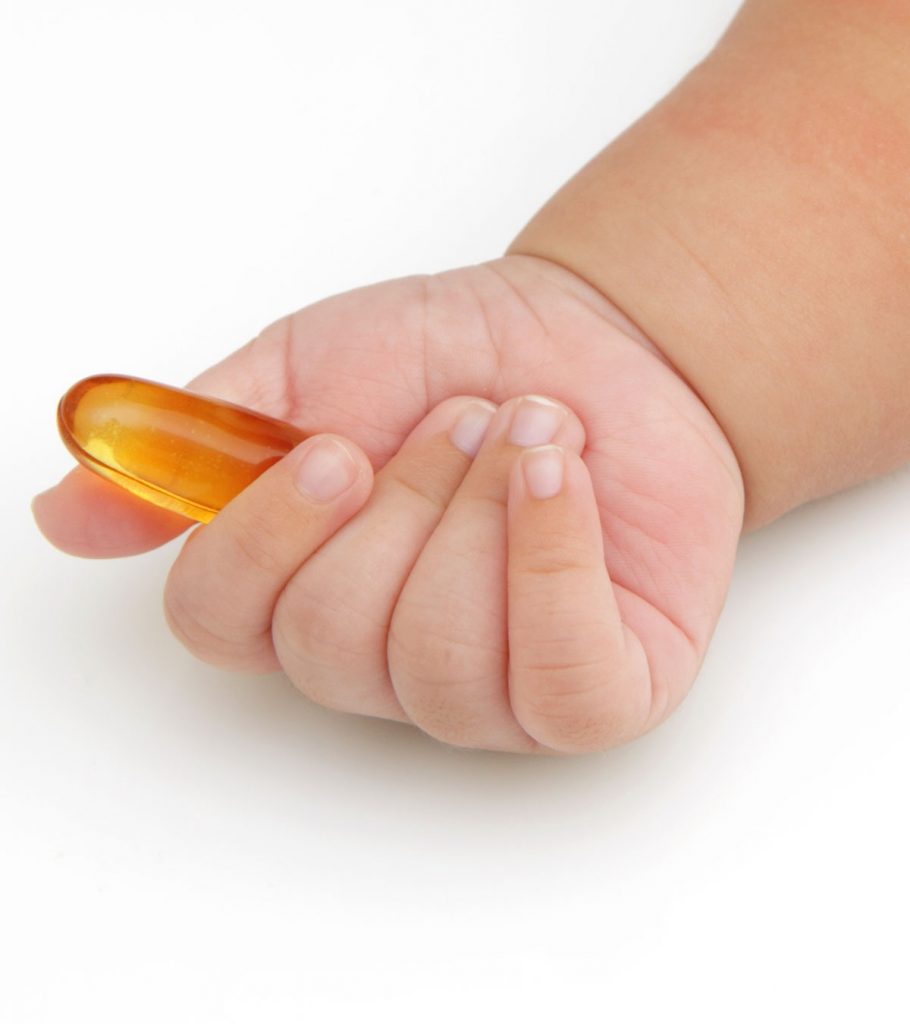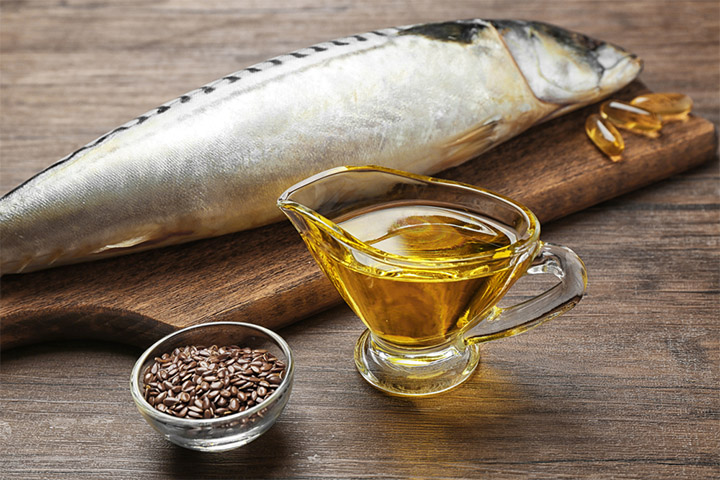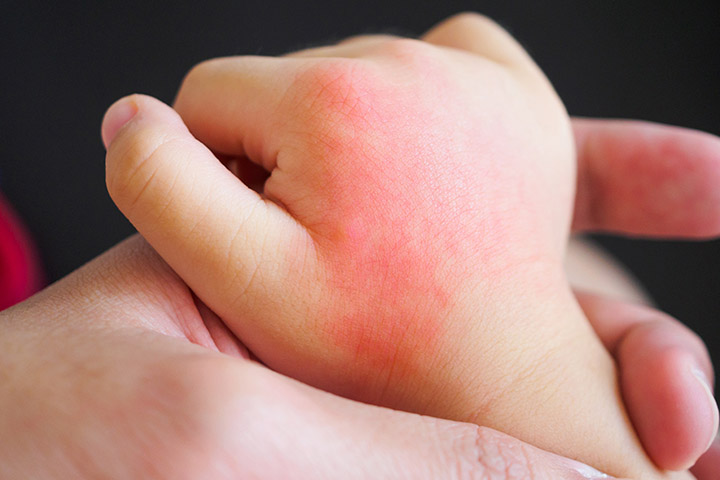Fish oil for babies could be an effective way to supplement omega-3 fatty acids in their diet. Fish is one of the richest sources of omega-3 fatty acids. Generally, babies can eat fish as soon as they start eating solids.
However, if they can’t eat it for some reason, you may give them fish oil instead.
Read on to know more about the safety of fish oil for babies, the right age when babies can eat fish, its possible health benefits, and side effects.
Is Fish Oil Safe For Babies?
The US Food and Drug Administration (FDA) has marked fish oil “generally recognized as safe (GRAS)” food (1). The safe intake limit is three grams a day for adults. In general, babies under the age of one year need 0.5 grams of omega-3 fatty acids a day (2).
Consult a pediatrician/dietitian to determine the safe intake limit for infants.
When Can Babies Have Fish Oil?
According to the American Academy of Pediatrics (AAP), within a few months of starting solids, an infant’s daily diet should include a variety of foods, including fish (3). However, it is not known if the rule applies to fish oil as well. If your baby consumes fish regularly and it suits him/her, then fish oil also might go well with the baby and contribute to infant nutrition. Moderate consumption of fish on a regular basis should be able to meet your baby’s nutritional needs of omega-3 fatty acids. But if you want to introduce fish oil, do consult a pediatrician.
What Are The Health Benefits of Fish Oil For Babies?
Fish oil is obtained from the tissues of the oily fish. An example of fish oil is cod liver oil, which is extracted from the liver of the cod, an oily fish. The oil is an excellent source of omega-3 fatty acids, such as EPA (eicosapentaenoic acid) and DHA (docosahexaenoic acid), which cannot be synthesized by the body (4). Below are some of the benefits of fish oil.
- Brain growth and cognitive development: Omega-3 fatty acids, such as EPA and DHA, are required for proper brain growth and cognitive development in infants (5). They also offer neuroprotection and facilitate cognitive development.iXDevelopment of a child’s intellectual abilities, including information processing, problem-solving, and decision-making They also offer neuroprotection and facilitate neurological development. DHA deficiency, in specific, is associated with poor cognitive developmenti leading to learning difficulties (6). Using fish oil nutritional supplements with a baby’s well-balanced diet after a doctor consultation might help.
- Eye development: Various research studies have shown that essential fatty acids, such as DHA (omega-3 fatty acids), may be beneficial in aiding the optimum development of vision (7). Besides, DHA may help preserve vision health and fight chronic inflammation of the eyelids in the long run (8).
- Heart health: Regular consumption of fish oils may have heart-protective effects. The omega-3 can possibly lower blood pressure and improve the health of the blood vessels (9). Besides, the fatty acids are also known to reduce triglyceridesiXCommon type of fats obtained from food sources and stored in the bloodstream and slow down the plaqueiXA buildup of fatty and sticky substances in the blood vessels of the heart build-up (10) (11). These benefits can be relevant to the baby in the long run.
- Immunity: The DHA is found to have immunity-enhancing properties (12). Omega-3 fatty acids also display anti-inflammatory effects that play a vital role in enhancing immunity (13) (14).
- Bone health: Some studies show that regular consumption of fish oil might have bone protective effects (15), and fish oil supplements can help reduce joint pain and stiffness, promoting joint health (16). However, more clinical trials are needed to establish the exact mechanism. Fish oil also contains vitamin D that helps maintain bone health.
- Skincare: The use of fish oil has shown beneficial effects on the development of the cutaneous systemiXOrgan systems, including the skin, hair, and nails that provide protection (from injury and infection) and regulate body temperature. It is reported that fish oil could possibly reduce the severity of some skin conditions, such as eczemaiXA skin condition that causes itchy, red, and scaly patches on the skin due to various factors such as allergies, genetics, or stress and dermatitisiXInflammatory skin conditions caused by infections, genetics, or reaction to an allergic substance (17). These benefits are attributed to the omega-3 and omega-6 PUFAs present in it.
- Overall health: Besides omega-3 fatty acids, fish oil contains other micronutrients such as iodine, selenium, vitamins A and D, and bioactive compounds. Therefore, regular fish oil intake could help strengthen the immune system and maintain the baby’s overall health and well-being.
It is believed that consuming fish oil can benefit babies with ADHD and asthma. However, this topic has limited research and more studies are needed to confirm the potential benefits.
All the benefits of fish oil confer when it is a part of a well-balanced diet for the baby. But just like any other food item, fish oils have their share of side-effects too.
Possible Side Effects Of Fish Oil In Babies
The following are some of the likely side effects of fish oil.
- General discomfort: Fish oil has some general side effects like causing unpleasant taste in the mouth, bad breath, foul-smelling sweat, and headache (18). These side-effects are mild and may or may not happen to all the babies. Some babies might also experience gastrointestinal issues such as heartburn, nausea, and diarrhea.
- Possible drug interaction: Fish oil can have some possible drug interactions. Therefore, if your baby is on medications, then make sure to discuss with the pediatrician the safety of fish oil (19).
- Harmful ingredients: Some fish oil supplements might contain added substances that may not suit babies. Therefore, selecting a fish oil supplement must be done in consultation with a pediatrician.
- Allergy: An infant who is allergic to seafood might be allergic to fish too. Some basic symptoms of fish allergy are headache, nausea, stomach cramps, indigestion, stuffy or runny nose, and anaphylaxisiXAn extreme reaction to an allergen causing breathing difficulties and loss of consciousness (20). If your baby has a seafood allergy or any other existing allergies, then consult a pediatrician before giving fish oil or fish oil supplement.
- Overdose: High dosage of fish oil supplementation is associated with decreased immunity, increased anti-coagulation, and toxicity.
If your baby shows any unusual symptoms after consuming a fish oil supplement, then stop its use and seek prompt medical attention.
When To Avoid Fish Oil For Infants?
Avoid fish oil if the baby.
- Has a medical condition, especially a blood disorder.
- Is allergic to fish or seafood.
- Is on antiplatelet medicines or other medications that may be less effective in the presence of fish oil
Consult a pediatrician since there might be exceptions where the baby might be able to have fish oil safely.
How To Make Your Baby Consume Fish Oil?
It may not be easy to introduce fish oil to babies since they could dislike the taste. The following are some tips to introduce fish oil to a baby.
- Try offering flavored fish oil. The flavor could help mask the fish smell.
- You can mix the flavored fish oil to applesauce or any of your baby’s favorite treats. Add fish oil to a bottle of milk, soft porridge, smoothie, or yogurt.
- Sprinkle fish oil over pureed veggies.
- Once your baby starts to chew, you can opt for chewable fish oil supplements.
Fish oils for babies are rich in omega-3 fatty acids that support infant growth and boost their brain, eye, and general health. You may ask a pediatrician for more personalized information to avoid overdosing. However, you must ensure that your baby is not allergic to fish oil. It is also important to buy fish oil from trusted sources and store it safely to avoid contamination with other ingredients. Fish oils are contraindicated in babies with blood disorders and taking blood-thinning medications.
Key Pointers
- Fish oil is rich in omega-3 fatty acids and can benefit babies’ brain, eye, heart, immunity, bone, and skincare health.
- Caution should be taken when giving fish oil to babies due to potential discomfort, drug interaction, harmful ingredients, allergy, and overdose.
- Avoid giving fish oil to infants with medical conditions or allergies to fish/seafood, as well as those taking certain medications.
- Consult a pediatrician for safe intake limits when giving fish oil to babies.
Learn from a pediatrician how to properly encourage your children to consume fish oil. Get practical advice and recommendations on introducing fish oil into your child’s daily regimen.















